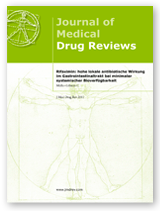
Das Journal of Medical Drug Reviews ist ein "Open Access"-Journal. Alle Artikel können für die persönliche Information des einzelnen Nutzers kostenlos heruntergeladen werden. Hingegen ist für eine kommerzielle Nutzung der Inhalte dieses Journals in jedwedem Medium die schriftliche Genehmigung des Verlages zwingend erforderlich. Das Urheberrecht liegt ausschließlich beim Verlag Reprint Publications GmbH & Co. KG.
© Reprint Publications 2016,
Webdesign Bothgrafik,
Programmierung amr
Long-term benefit of early multiple sclerosis treatment with interferon beta-1b: lower disease activity, delayed disability progression, improved overall survival
J Med Drug Rev 2012;2;31-39ABSTRACT (Review-Artikel in deutscher Sprache)
Multiple sclerosis (MS) often starts in early adulthood und thereafter typically takes a course over several decades. However, clinical studies in MS with usual treatment periods of one to three years cover this long-term course only inadequately. In contrast to this, the clinical development program of betaferon® (interferon-beta-1b, IFNβ-1b) paid special attention to the long-term follow-up of patients even after the termination of the pivotal clinical studies.
To gain marketing admission for IFNβ-1b, three large placebo-controlled studies were conducted: a) in patients with relapsing-remittent MS (RRMS), b) in patients with clinically isolated syndromes (CIS), and c) in patients with secondary progressive MS (SPMS). 8-year follow-up data are available for the CIS and SPMS studies. Regarding the RRMS study, efficacy and safety of IFNβ-1b treatment were analysed after 16 years and mortality data were collected after 21 years.
The 8-year follow-up study demonstrated the benefit of early IFNβ-1b treatment (within 60 days after CIS onset) by a lower incidence of clinical definitive MS (CDMS) compared with delayed treatment (the group originally receiving placebo; 55.5% vs. 65.8%). Additionally, a lower relapse rate was observed during the whole 8-year period (0.20 vs. 0.26 annually). In SPMS patients, early IFNβ-1b treatment significantly delayed the disability progression over 6 years; the 8-year data still show a strong trend regarding this parameter.
16-year data: Early IFNβ-1b treatment of RRMS (250 µg subcutaneously every other day) is effective and delays disability progression according to a correlative model. Additionally, 21-year data demonstrate a significant mortality reduction by almost half compared with the group originally receiving placebo (hazard ratio: 0.532, 95 % CI: 0.314-0.902, P=0.0137).
Conclusions
The methodically carefully designed and performed long-term follow-ups in MS patients confirm the maintained benefit of early IFNβ-1b treatment even after 8, 16, and 21 years.

